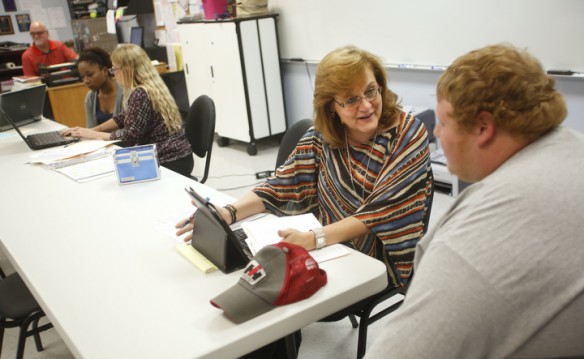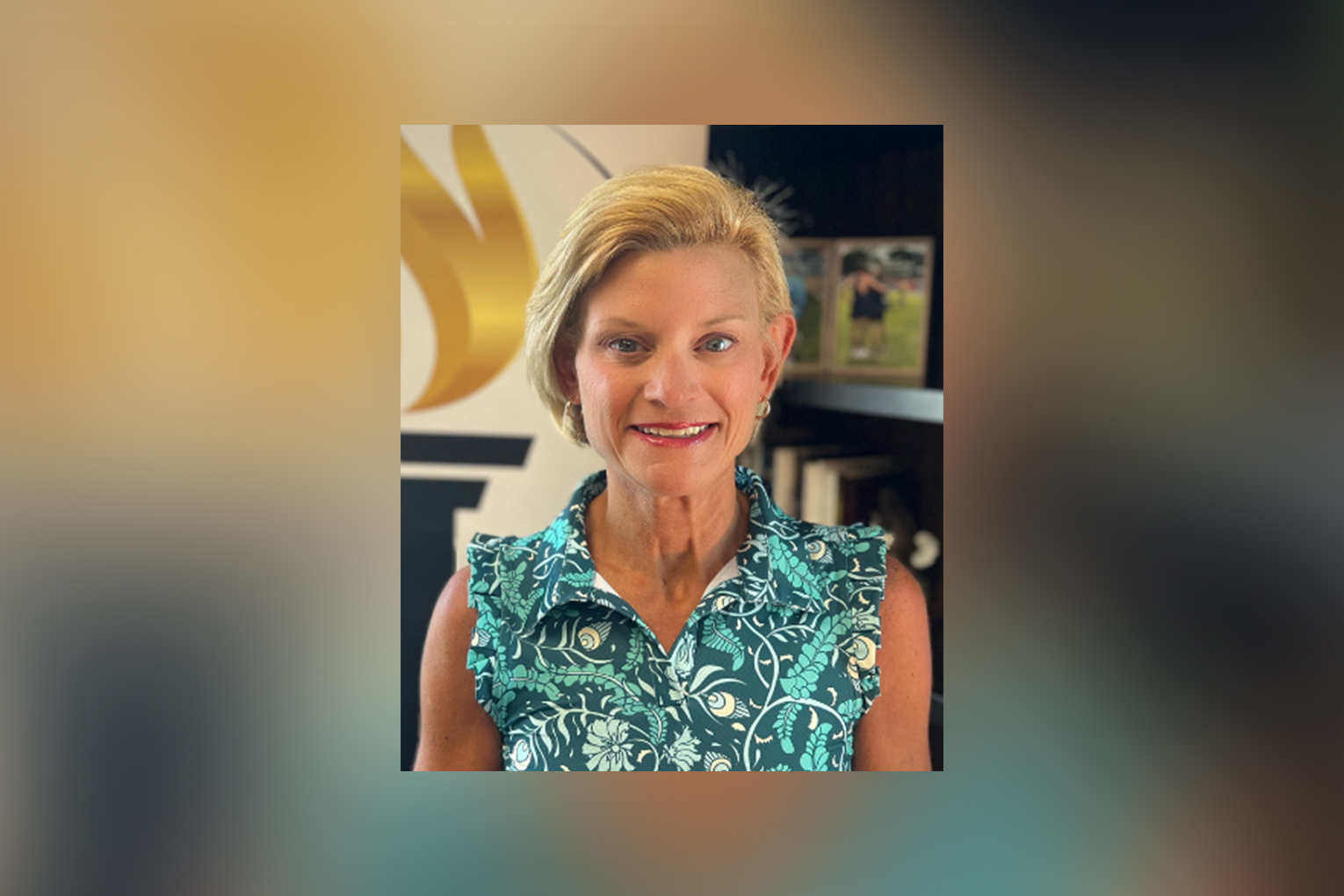
Shelia Baugh, director of specialized instructional programs for Simpson County Schools, reviews junior Garrett Cothern’s recent assignment grades with him during a Student Support Team meeting at Franklin-Simpson High School.
Photo by Amy Wallot, May 15, 2014
By Susan Riddell
susan.riddell@education.ky.gov
When students are called to Franklin-Simpson High School teacher Stephanie Cornwell’s office they not only know why – they arrive at her office with plans for how they will get back on track academically.
“I have students come in to see me ready with their own analysis of why they have been called down to see me,” said Cornwell, a special education teacher at the school. “I also have students who voluntarily stop by to see me other times in the week to check in or just to let me know they have completed what we have discussed. They even thank me for keeping them accountable.”
The student ownership is the result of a student monitoring program undertaken by the school this past school year that focused on raising achievement for students who have traditionally struggled academically, including low-income, minority and special education students. The program proved so successful it garnered the school and educators involved with it a Johnnie Grissom Award. Already recognized by the state for greatly improving its college- and career-readiness rates, school officials decided to turn their attention to reducing the school’s achievement gap.
“We knew that we were going to include all of our students with disabilities that make up approximately 13 percent of our school age population,” said Shelia Baugh, director of Special Instruction Programs for the Simpson County school district. “We also have 11.5 percent of our student minorities and approximately 60 percent of our students who receive free- or reduced-priced lunch.”
To create the monitoring program the school set up what is called a Student Support Team, which originally consisted of special education teachers and the classroom teachers who taught end-of-course subjects: English II, Algebra II, Biology and U.S. History.
Baugh said the teachers were chosen because data showed that the school’s gap students weren’t as successful on end-of-course exams.
“We wanted to address the deficit in a meaningful way,” Baugh said.
Eventually, seniors taking English IV were added to the students eligible for monitoring, as were Algebra I students, Baugh said. The support team then added a mathematics interventionist, clerical assistant, Algebra I and English IV teachers and the director of special education. Some 200 students were monitored and supported on a weekly basis. As part of the monitoring, a student and a support team member look over recent grades, attendance and behavior in a proactive way. They celebrate successes and discuss ways to improve.
For attendance, a student couldn’t miss more than one day in a four-week period. Additionally, a student couldn’t be referred for behavior issues during the four weeks, and couldn’t get anything below a D or they would qualify to receive rewards.
In addition to these discussions, when a team member would meet with students individually, goals were set, regular communication was prepared to share with parents, and rewards were handed out on a weekly basis when goals were met.
“Additionally, makeup tests, missing assignments, quizzes and test corrections are completed during the student’s elective class period,” Baugh said. “The students are being taught the habit of ‘putting first things first’ by doing their schoolwork before they get to take the class that they enjoy. Also, the students are being taught the habit ‘be proactive’ by looking up their grades, talking with their teacher, making arrangements for missing assignments, etc.”
Cornwell said she typically works with 22 students as part of the support team. When meeting with the students individually, she usually had them make observations based on their progress reports and pre-assessments before developing a specific, measurable, attainable, realistic and time-bound (SMART) goal that gave them ownership of the process. The process helped students take ownership of their own learning.
“Many of them come in and have already looked at their grades and have learned to self-advocate by going to the teacher and developing a plan for re-taking a test or making up the lab that they missed prior to the Thursday meeting,” Baugh said.
“When students receive a card from us for 12 weeks consecutively, they meet the criteria to go to a monitoring status and not be called down for the weekly meeting,” Baugh added. “We celebrate the accomplishment with the student and tell them they have graduated from the program. So far, we have not had a student who has had to come back into the program once they have exited.”
The program also yielded other positive results in its first trimester. Student failure rates went down as did behavior problems, and attendance increased.
Teachers involved agree they have benefitted, too.
English teacher Alison Raymer said this program has helped her zone in on key standards she wants her students to better grasp.
“Sometimes I think teachers get caught up in assigning work and putting in grades, and we forget why we are creating assignments,” Raymer said. “The goal is student achievement and mastery toward standards, not a grade due to completion or compliance.”
Special education teacher Steve Cauley said he has been able to make strong connections with students he normally wouldn’t come in contact with in the building.
“It has helped me have a better understanding of what special education needs are but also what our gap students need,” Cauley said. “It has been very rewarding to see all these students be successful through this program.”
The team is looking forward to working with the students again this coming school year, and has branched out to the nearby middle and alternative schools.
“Those 8th graders who are in the program now will automatically begin in the program as 9th graders in the high school,” Baugh said. “After seeing the success of the system at the high school and middle school, we began the student support teams in our intermediate classes, too, after Christmas.
“Our goal is to teach our students that they need to do their best at anything that they do; after all, they are putting their name on what they do,” Baugh added.
Baugh echoed what teachers said about how this effort has raised the bar for everyone involved.
“As a veteran administrator, I can tell you that this year has been a year that I have worked harder than I can remember. However, it has also been the most rewarding,” she said. “Watching these students learn good habits for life and navigate in a proactive way has been so inspiring. After all, that is what we want for all of our students.”
MORE INFO…
Robin Winnecke-Poynter, robin.winnecke@education.ky.gov, (270) 929-5068
Shelia Baugh, shelia.baugh@simpson.kyschools.us, (270) 586-8877






Leave A Comment